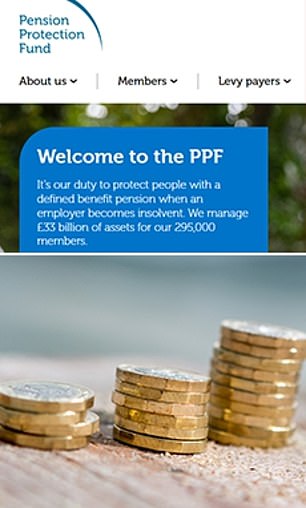
Why only a 2.5% raise? l’m sure everyone could do with a bigger increase
As a client of the Pension Protection Fund I have a comment to make about their generosity (or otherwise).
I know they do a good job; I paid into a company scheme for 20 years before it was frozen and 10 years later the company went into administration (voluntary I think) when I still had three years left before I could draw the state pension.
Now that I am receiving my pension through the PPF only about half of it is indexed for inflation because of the change in rules in 1997.
ln a recent letter they said that although they have billions of pounds of assets they have decided not to increase the indexable part of the pension by more than the 2.5 per cent required by the rules.
To me this seems rather unfair. l’m sure everyone could do with a bigger increase because it is actually decreasing in real terms.
SCROLL DOWN TO FIND OUT HOW TO ASK STEVE YOUR PENSION QUESTION
Steve Webb replies: The recent surge in inflation has understandably led to a renewed focus on the rules which govern how much our pensions go up by each year.
When inflation is low, people may manage even if their pension goes up by a lower figure, but when we see double-digit inflation this can really dig into our standard of living.
As you know, the Pension Protection Fund provides a measure of protection to those who were in company pension schemes where the sponsoring employer who stood behind their scheme went bust.

Got a question for Steve Webb? Scroll down to find out how to contact him
There are various respects in which the compensation provided by the PPF may fall short of the actual pension you would have received had your scheme continued.
The most obvious of these is that people who were under pension age when the employer went bust will have compensation based on 90 per cent of their pension rather than 100 per cent for those who were over pension age.
But a less obvious limitation on PPF compensation is the fact that annual increases in respect of inflation are limited and may be less generous than the increases you would have received if your scheme had continued.
For example, inflation increases paid by the PPF use the Consumer Prices Index (CPI) as the measure of inflation whereas many company pension schemes pay increases based on the (usually higher) Retail Prices Index (RPI).
In addition to this, as you say, for pensions in payment, service in a pension scheme before 1997 attracts no inflation protection at all, whilst post 1997 service gets indexation only up to a cap of 2.5 per cent.
This is an important limitation, and the PPF website indicates that in 10 of the last 18 years that 2.5 per cent cap has been applied: Pension Protection Fund – Will my pension increase?
The issue of PPF increases often falling below inflation is one that has been rumbling on for a long time. Indeed, I wrote a column about this very issue more than three years ago: Why don’t PPF payments ever rise with inflation?
However, there are two reasons why the political temperature on this issue has been turned up recently.
The first, as noted earlier, is that a prolonged period of high inflation has made these limited annual increases much more painful.
The second is actually a byproduct of the PPF’s success.
STEVE WEBB ANSWERS YOUR PENSION QUESTIONS

The financial position of the PPF has improved markedly in recent years. In part this reflects things like the increase in interest rates which has improved the financial position of company pension schemes and of the PPF.
But the PPF has also achieved good investment returns (thereby boosting the assets of the PPF) and has seen lower than expected claims (thereby reducing the expected outlays).
Although the PPF does not like to talk about having a ‘surplus’, its latest annual report shows that PPF has ‘reserves’ of just over £12billion: Pension Protection Fund annual report and accounts 2022/23.
This could be thought of as a ‘buffer’ over and above the money that PPF expects to have to spend meeting the liabilities which it has taken on to date and will take on in the future.
This large figure does, of course, raise the question as to whether some of it could be used up in paying bigger inflation increases to the nearly 200,000 people who currently receive PPF compensation.
This issue is specifically addressed in its latest annual report which explains that although PPF is bound by law in terms of the rules on pre 1997 service, the organisation can be more generous on post 1997 service if it feels this is appropriate.
The report says that the Board of the PPF looked at a range of factors, including the fact that they only had the power to change things with regard to post 1997 service (and not the bigger squeeze on pre 1997 service) and the fact that the Government itself had not indicated any change in policy. But in the end they decided to make no change at this stage.
However, the Work and Pensions Select Committee of the House of Commons has been looking into this matter and took oral evidence from the (then) Chief Executive of the PPF, Oliver Morley in November.
You can read a transcript of the evidence session here: Work and Pensions Committee: Defined benefit pension schemes
They also heard representations from pensioners unhappy at the limited level of inflation protection.
The PPF’s position as set out by its chief executive is that ultimately it is a matter for politicians to make a decision about the rules around PPF compensation.
The PPF was created by an Act of Parliament which set rules and limits as to what PPF can and cannot do, and his view was that any change to those rules should also be determined by Parliament.
But, perhaps surprisingly, he did however add that, with regard to the lack of indexation on pre-1997 service, he felt that ‘there is a good case on equity grounds’ for taking action.
In addition, the new Pensions Minister, Paul Maynard MP, subsequently told the Committee he had asked civil servants to look afresh at the whole issue of PPF indexation.
In short therefore, whether or not PPF compensation is improved in future is likely to depend primarily not on the PPF and its board but on the decisions of present and future ministers.
But with an election due in less than a year, this may be an issue where those affected will seek to bring pressure to get the rules changed.
Some links in this article may be affiliate links. If you click on them we may earn a small commission. That helps us fund This Is Money, and keep it free to use. We do not write articles to promote products. We do not allow any commercial relationship to affect our editorial independence.



